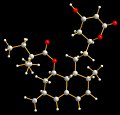
Long-term treatment with statins help lower cholesterol and reduce heart attack and stroke incidence. But, it seems, GPs have not been prescribing enough as yet another benefit is now being touted in new research published today in the British Journal of Pharmacology. This latest study suggests this action only needs a few days of treatment, is independent of cholesterol lowering and helps the heart to recover following a heart attack.
Jing-Lin ZHAO and colleagues at the Fuwai Heart Hospital, Beijing, China, have demonstrate decreased ‘no-reflow’ and better preservation of ventricular function in animals treated for only two days with a statin called simvastatin (structure shown). They also identify the mechanism underlying this cardioprotective action, showing that the observed beneficial effects of simavastatin are abolished by blocking the KATP channel in mitochondria.
Following a heart attack, blood does not flow properly into vessels in the heart, even once they are re-opened. Increasing the blood flow in these vessels would decrease the area known as ‘no-reflow’ and restore more of the ventricular function. ZHAO’s results suggest that taking statins long-term not only reduces the likelihood of a heart attack, but could also give the heart a chance to recover from a heart attack by decreasing the damage done to heart muscle.
Of course, if those heart attack patients had been on statins in the first place…